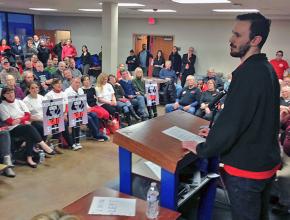Getting a union off the ground
reports on a gathering of labor activists and Delta workers in St. Paul to boost the struggle to win union recognition for some 40,000 Delta workers.
UNION MEMBERS, labor supporters and Delta Air Lines workers who are fighting to form a union rallied at the Regional Labor Federation in St. Paul, Minnesota, on April 4.
The feeling of hope and solidarity was strong as speakers talked about the organizing that has been taking place at airports across the country by Delta flight attendants and baggage handlers in their campaign to form a union with the International Association of Machinists and Aerospace Workers (IAM).
Some current Delta workers have previous union experience. But in 2008, when Delta merged with Twin Cities-based Northwest Airlines, management was able to shed collective bargaining with these employees--though Delta and Northwest pilots were able to secure a collective-bargaining agreement that year.
In 2010, flight attendants voted against union representation with the Communications Workers of America and baggage handlers and passenger service representatives rejected IAM representation by very narrow margins after an aggressive anti-union campaign in which employees and labor activists say management intimidated workers with surveillance, made thinly veiled threats about job security and attempted to "buy off" workers with bonuses for nonunion employees.

As union activist and former Delta baggage handler Kip Hedges told the St. Paul Union Advocate before the April 4 rally, "Workers face a Delta management team that is entrenched in its opposition to unionization and proud of their 80-year record as a nonunion carrier. Delta regularly tries to narrow the ability of rank and file organizers to reach their coworkers through intimidation and rules that flirt with the edge of federal law."
If the current union campaign is successful, it would represent a huge gain for the labor movement--some 40,000 Delta workers stand to gain representation. As one speaker at the rally put it, "This is the largest union drive in the world--that I'm aware of!"
THE PUSH to organize at Delta is being driven by rank-and-file workers who are exasperated with the conditions of their work.
As one employee explained, "Organizing your workplace doesn't happen because of one person being fed up, but because of a feeling within the workplace shared among many that this can't go on anymore. As an organizer, it's your job to organize that feeling into action."
Delta is the world's second-largest air carrier and had profits of some $3.6 billion in 2017 alone.
These profits are a result, in large part, of Delta's continual attempts to squeeze its workforce--cutting formerly full-time jobs with decent benefits in favor of a part-time, low-wage workforce. "We provide industry leading profits; we deserve an industry leading contract," explained a Delta ramp worker named Dan at the rally.
Other Delta workers voiced a number of their grievances, including fewer people being expected to do more work, part-time and inconsistent work, low wages, as well as a lack of job security and access to quality health care.
As one Delta worker explained to SocialistWorker.org in an interview in early April:
People feel like there's not going to be that full-time career around the corner. For instance, I was told in my interview that full-time would be possible after one or two years. Now Delta is telling us it's five years.
There are broken promises, like cutting our profit-sharing in half at a time when they are most profitable in their entire history. There are so many different reasons that people feel that unionizing is what's necessary.
Of particular concern is Delta's "Ready Reserve" program--through which, over the past two decades, the company has gradually replaced full-time, benefitted positions with part-time, temporary, un-benefitted employees.
As the Delta worker explained in the interview, "You don't receive paid vacations, flexible holidays or yearly raises. We top out at $15 an hour while full time tops out at $30. They've gone to a model where they're continually replacing full-time workers--one full-time worker with two Ready Reserves, and I'm tired of it."
The energy at the rally was palpable, with workers showing a clear vision and determined confidence that their collective power could force their employer to listen to their concerns on the job. Workers came from across the country to the rally, traveling from as far as Georgia, Wisconsin and Massachusetts.
As one Delta employee who traveled from the East Coast for the rally explained, "If I didn't come out, other people could have thought the same, and then we wouldn't all be here."


